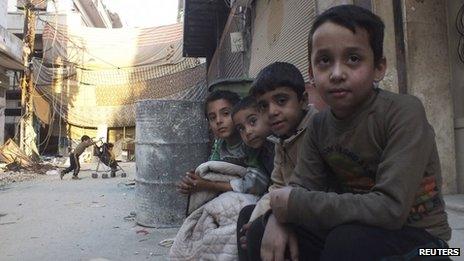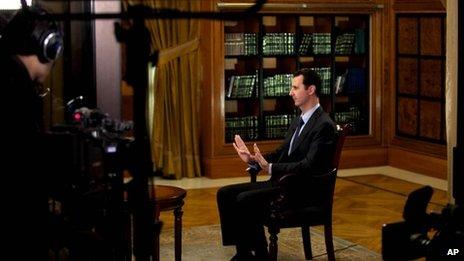Syria opposition urged to join 'Geneva II' talks
- Published
William Hague: "We have agreed a number of important steps"
Syria's moderate opposition should "commit itself fully" to planned peace talks, the Friends of Syria group of countries has said.
The talks in Geneva next month offered Syrians the "best hope to improve their lives", UK Foreign Secretary William Hague said.
Ministers had gathered in London to meet Syrian opposition officials.
A key group in Syria's main opposition alliance has threatened to boycott the planned meeting, dubbed Geneva II.
Mr Hague's US counterpart John Kerry said he believed and hoped the meeting would go ahead as planned but that Western countries could not control whether all parties would attend.
Addressing the opposition, Mr Kerry said: "You can win at the negotiating table what it may take a long time and a lot of... loss of life to win on the battlefield."
Ahmad Jarba, head of the main opposition grouping, the Syrian National Coalition (SNC), said the coalition would decide at a meeting next week whether to participate.
The SNC has previously been unwilling to talk to representatives of Mr Assad's government.
Mr Hague said the process envisaged by the Friends of Syria involved the establishment "by mutual consent" of "a transitional governing body with full executive powers".
Participants at the first round of talks in June 2012 (Geneva I) had sought to end the civil war by getting Damascus and the opposition to choose a transitional government.

The opposition says it is vital that aid be supplied to besieged areas
Safe corridors
Mr Hague reaffirmed the view of the Friends of Syria group - Britain, Egypt, France, Germany, Jordan, Italy, Qatar, Saudi Arabia, Turkey, the United Arab Emirates and the United States - that Geneva II must be about a political transition in Syria away from the regime of President Bashar al-Assad.
Any transitional government could only be agreed with the consent of the SNC, and therefore Mr Assad would play no role in it, Mr Hague added.
Mr Kerry said he expected representatives of the government to attend any talks and to "negotiate in good faith".
Mr Hague and Mr Kerry also pledged further backing for Syria's moderate opposition, aimed at bolstering them in the face of rising influence extremists from power in the war-gripped country.
Mr Jarba also spoke to reporters after the meeting, outlining the steps that he considered necessary for the success of the Geneva talks, including:
The setting up of safe corridors to deliver humanitarian aid to opposition-held areas currently besieged by government forces
The release of women and children the opposition say are in regime custody
Making any agreement between the two sides binding under Chapter 7 of the UN Charter, which authorises the use of force
Rejection of Iran playing an active role in the process; Mr Jarba accused Iran of having tens of thousands of militiamen active in Syria
More support for the armed opposition, including anti-aircraft weapons to "level the balance on the ground".
Iran as yet has no role in Geneva II, but Mr Hague earlier told the BBC he was trying to use new positive diplomatic relations with Iran to encourage it to play a "more constructive role".
Also on Tuesday, the UN Special Co-ordinator for the mission to destroy Syria's chemical weapons, Sigrid Kaag, said in a statement, external that to date, the Syrian government had "fully co-operated" in the mission's work.
Western officials have been buoyed by the initial results of the chemical disarmament effort, the BBC's diplomatic correspondent Jonathan Marcus says.
But he adds that they are painfully aware that the recent chemical deal has done nothing to alter the course of the civil war or to reduce the burgeoning humanitarian catastrophe in and around Syria.

Mr Assad gave no indication of being prepared to stand down
'No obstacles'
On Monday, Mr Assad told Lebanon's al-Mayadeen television that he saw no reason why he could not run for the presidency again in 2014.
"Personally, I don't see any obstacles to being nominated to run in the next presidential elections," he was quoted as saying by the channel.
Mr Assad told the channel that his government would take part in the conference without preconditions, but suggested the prospects that it would reach a settlement were, at present, dim.
"No time has been set, and the factors are not yet in place if we want to succeed," he told al-Mayadeen.
"Which forces are taking part? What relation do these forces have with the Syrian people? Do these forces represent the Syrian people, or do they represent the states that invented them?" he asked.
Saudi Arabia and Qatar are key funders of opposition forces in Syria, including, it is believed, hardline Islamist groups.
After Tuesday's meeting, Mr Kerry was asked about reports quoting the Saudi intelligence chief, Prince Bandar bin Sultan, as saying his country would make a "major shift" in its relations with the US because of Saudi impatience with perceived Western inaction on Syria.
Mr Kerry played down the report, insisting the two countries were "on the same page".
More than 100,000 people have been killed since the Syrian conflict began in 2011.
The UN estimates that by the end of 2014 more than eight million Syrians could have been forced from their homes, including 5.2 million who will have fled the country.